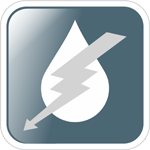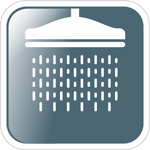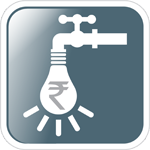Products FAQ
1.Why Tankless?
Tankless water heaters heat the water directly at the point of use – and only when the water flows. That means in contrast to conventional storage heaters no hot water is stored. That avoids expensive heat losses. As a result instantaneous water heaters are more economic than conventional storage heaters. Electronically controlled instantaneous water heaters are particularly energy efficient, because they automatically adapt the power output to actual requirements.
Instant Hot Water
Tankless water heaters have higher rated heating capacity and heat water directly as the water flows through it.
The bare wires/heating elements instantly heat the water as it flows through the unit. So no more waiting for hot water!
Continuous Hot Water
Tankless water heaters turn on based on flow sensor and the water will keep heating as long as the water is on without any interruption. So no more cold showers!
Energy Saving
Tankless water heaters consume electricity only when water is being used and hence there are no standby losses as associated with storage water heaters.
The unit is activated only when the hot tap is turned on and switches off when the tap is turned off. No storage tank means no need to heat and reheat the water which means high energy savings.
Maintenance Free
Tankless water heaters are suitable for hard water and since there is no storage tank and hence there is limited residual mineral or other deposit which is the main cause for higher maintenance.
Also tankless heaters don’t require any venting which results in low maintenance.
Back up for Solar/Heat Pump
Tankless water heaters are an ideal combination with solar/ heat pumps and will give you the most efficient energy output with providing hot water at the desired temperature throughout the year.
When the water temperature in the solar storage tank drops below a pre-set point, tankless water heater temperature sensors accept the preheated incoming water and apply a temperature only which is required, helping to maintain consistent temperature hot water delivery.
Space Saver
Tankless water heaters don’t have a tank and hence are up to 90% smaller than a storage water heater.
Smaller size means more volumetric space for your bathroom, lower interior/building costs and easy access for maintenance when required.
Stiebel Eltron heaters have been awarded many global design awards for their quality and aesthetics.1.
2. How Tankless Works?
Tankless water heaters operate based on bare wire heating technology. The unit is activated through the flow of water and bare wire heats the water instantly as it flows through the unit.
When a hot water faucet is turned on, a flow sensor in the heater detects that the water is moving and turns on a bank of heating elements or modules. The water passes over the heating modules, usually in series, and exits the heater at the desired temperature. Since tankless water heaters do the entire job of a conventional tank-type water heater in just seconds, they require very high powered heating elements. A collection of sensors and a microprocessor will control the output water temperature to ensure that a precise output temperature is maintain during operation. When the water is turned off, the unit turns off completely and consumes absolutely no power again until a hot water faucet is turned on.
The outlet temperature can be set through the control panel on the unit itself. The output temperature is determined by the following three factors :
1. Flow Rate of water into unit (I/min)
2. Cold Water inlet temperature(°C)
3. Appliance output (kw)
3. How are Tankless Water Heaters different from storage and instant heaters available in the market in India?
Instant water heaters in India should not be confused with tankless water heaters – commonly known instant water heaters in India are nothing but small storage water heaters between 1-6 liters and they do not provide hot water instantly and consistently. The table below will show you the differences between storage and instant water heaters.
| Particulars | Tankless | Storage |
|---|---|---|
| Energy Efficient | Yes | No |
| Water Saving | Yes | No |
| Unlimited Water Supply | Yes | No |
| Space Saving | Yes | No |
| Time Saving | Yes | No |
| Pricing | High Pricing, backed by significant Value | Lower Pricing, delivering little customer value |
4. Where do you generally install the heaters?
Heaters can be installed inside or outside the shower area. They can be installed any any height as long as there is requisite pressure of 1- 1.5 bar which is necessary for the geyser to operate and result in adequate shower performance.
Tankless Water Heaters should be installed vertically only and as recommended/shown in the installation/user manual and/or advised by authorised technician.
5. Is there is specific plumbing, electrical and pressure requirement to install and operate these heaters?
Plumbing requirements
- Yes, the geyser has specific plumbing requirements due to its design and needs to be installed by means of a template or by an approved authorised technician
Electrical requirements
- Products are both 1 phase and 3 phase – therefore it is important to know what phase connection is available in the target/customer building/residence
- Yes, the wiring for Tankless Water Heaters has specific requirements:
- The wiring has to be done directly from the geyser to the distribution board (DB)
- The wire thickness and the circuit breaker capacity will depend on the rated power capacity of the geyser – see customer and technical service or product info sheet for more information
Pressure requirements
- Minimum pressure of 1-1.5 bar is needed to activate units which represent inflow rates of water at between 2-4 litre of water depending on the pipe thickness
6. Can you have one heater for 2 bathrooms?
Yes, if the distances between bathrooms are not significant, however, a higher capacity unit must be recommended and the risk of lower flow rate exists if the showers are on at the exact same time
7. Can these water heaters be used as back up for solar?
Yes, in fact these heaters are the best back up for solar since they activate on flow of water and only activate if the set temperature from solar is not achieved, providing instant back up and energy saving at the same time
8. Does your Tankless Water Heaters have BEE Star and ISI rating?
No, Our Products does not have any Indian BEE energy ratings as the ratings as there is no standard currently for tankless water heaters. Tankless Water Heaters doe not require BIS/ISI rating . Our Tankless Water Heaters globally has various energy efficient ratings and is in compliance with IEC (European norms) which Indian standards are based upon, so no compromise on safety and energy
9. What is the warranty for the product?
Tankless Water Heaters products are designed, produced and shipped free from defects and will function reliably when installed properly, used correctly and treated in accordance with Tankless Water Heaters installation and operating instructions.
The warranty period for ALL Tankless Water Heaters water heater models is as follows
- heating element and tank – 2 years
- all other parts-12 months warranty
Tankless Water Heaters or the authorised service centre /agent will at their option repair or replace those products which within the warranty period stated above subject to the following terms and conditions:
- Liability under the warranty will only be covered if the installation of the water heater has been carried out by an authorised representative of the Company or an authorised/approved trained contractor
- Liability under warranty will only be covered for defects which occur under conditions of normal operation an under proper use
- Liability under warranty does not cover damage due to calcification and foreign matter intervention
- Inspection report of the Company’s authorised technician will be treated as final and binding under the warranty for determining the defects, repairs/alterations required or carried out or certifying working of the goods thereafter
- The customer will have no claim under this warranty in respect of personal injury, damage or property or consequential damages, or for utilisation of the goods not in accordance with the user manual
Warranty is only valid on producing a valid invoice showing purchase of the product from an authorised reseller or a copy of the warranty card duly filled in and signed/stamped by the reseller.
10. What is your turnaround time (TAT) for service? How is it compared to your competitors?
Our target TAT is between 36 hours and is on par or better than our competitors.
11. What is the availability of spare parts?
Spare parts are readily available at our service centre. In case of issues with the water heater we have stand by units which we give the customer until the unit is repaired – unless the heater problem can be resolved the same day on site.
12. How do tankless water heaters save energy compared to storage water heaters?
- Tankless water heaters save energy vis a vis storage due to more efficient usage and zero standby losses
- Heating only happens when the water is on energy is saved since no heating and reheating is happening even while the water is not being used.
- Energy consumption is based on delta t – temp desired/set less ambient temperature so excess heating does not happen
- Due to less salt deposition on its heating element the heating is more efficient compared to storage and hence less energy consumption is required
13. Are tankless water heaters suitable for hard water and if so how?
Yes, tankless water heaters are suitable for hard water however, they are not immune to the effects of hard water. Tankless Water Heaters have thin /bare wires made of Nichrome on which salt deposition is less/more difficult. Further, the chamber for water storage is small so the exposure to salts is less. Lastly tankless water heaters have temperature control and generally do not heat water more than 50 degrees hence calcification which occurs at higher temperatures of 60-8o- degrees does not happen as compared to storage. However, if the Hardness of water is above 150 we recommend either a scale inhibition /filtration system or a water softener from 3M water filtration products for the whole house or bathroom. This will increase the life of all fittings and appliances not only the water heater.
14. Since tankless water heaters have high kw rating how can I install 3-4 heaters in my house when my connected /sanctioned load is not so high?
Tankless water heaters operate only on flow of water and hence the diversity to be assumed for any house should be assumed as if 2 water heaters are on at the same time only. This means the following diverisity for electricity load calculation
2 Bathrooms – 100 percent
3 bathrooms – 66 percent
4 bathrooms – 50 percent
Further, the maximum consumption of power only happens early morning in winter months when air conditioners and other lights/appliances are typically not used and hence there is a natural hedge /compensation for the same. As the day progresses the consumption of electricity for the water heater goes down and gets compensated by the consumption of other appliances.
15. What are the safety features of Tankless Water Heaters?
- Anti-scalding (anti burn) automatically built in since temperature is delivered based on set temperature
- Shock proof – in built Earth leakage circuit breakers( ELCB) – helps detect disturbances and interrupts the circuit if dangerous voltage is detected
- Splash proof – International Protection rating (IP rating) – All water heaters of Tankless Water Heaters are Splash proof with IP 25 and IP 24 rating. This means that parts which are exposed are rigorously tested by spraying water at a certain speed via a hose/pipe of diameter of 12.5mm and are checked to ensure that no water is entered into the electrical components through the exposed areas.
16. What if the overhead tank is empty and the water heater is on?
The water heater will not switch on without flow of water
17. Can the water heater be kept on the loft. Does it require ventilation?
The water heater does not require any ventilation; however it should preferably be installed in an area where it can be reached easily so that the temperature and other settings can be changed when needed.
18. Can the water heaters be kept horizontally?
Tankless Water Heaters should be installed vertically only and as recommended/shown in the installation/user manual and/or advised by Tankless Water Heaters authorised technician.
19. Why a 10sq.mm or 6sqmm wire?
Higher capacity wires are required to carry higher voltage due to higher capacity of the water heaters.
20. Why does the wiring need to be done directly to the DB?
Since the rated power of Tankless Water Heaters heaters is higher than most appliances in a household, the power supply channel should be independent to avoid distribution/sharing with other appliances.
21. If one has 4 heaters in 4 bathrooms and all are on the same time then load consumption would be very high.
The load consumption would depend on the usage patterns and the flow rate since it is likely to different. The difference would be the same if you had 4 storage heaters on at the same time.
22. If there is three phase connection can you put single phase water heaters?
Yes you can, however wherever there is a 1 phase connection you cannot put a 3 phase heater.
1. What is a Heat Pump?
The air to water heat pump works great in applications where the need is for hot water. Applications requiring significant hot water usage will maximize energy savings for the shortest payback periods. Best of all, heat pump heaters are three times more efficient than standard electric water heaters and up to four times more efficient than conventional gas water heaters.
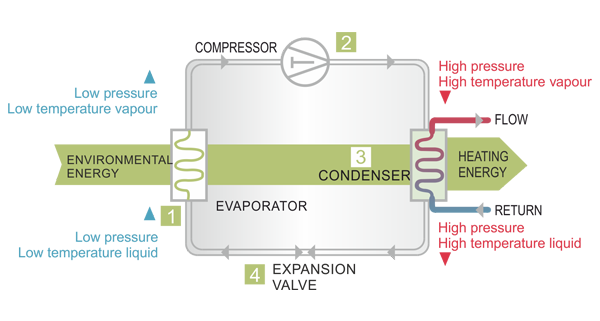
COMMON APPLICATIONS
- Commercial : Restaurant/Kitchens
- Institutional : Hospitals, Hotels, Schools, Hostels, Resorts
- Residential : Villas, Apparments, Guest houses
- Industrial : Factories, Laundries
2. How Does It Work?
Tankless water heaters operate based on bare wire heating technology. The unit is activated through the flow of water and bare wire heats the water instantly as it flows through the unit.
When a hot water faucet is turned on, a flow sensor in the heater detects that the water is moving and turns on a bank of heating elements or modules. The water passes over the heating modules, usually in series, and exits the heater at the desired temperature. Since tankless water heaters do the entire job of a conventional tank-type water heater in just seconds, they require very high powered heating elements. A collection of sensors and a microprocessor will control the output water temperature to ensure that a precise output temperature is maintain during operation. When the water is turned off, the unit turns off completely and consumes absolutely no power again until a hot water faucet is turned on.
Heat pump water heaters capture heat and humidity from the surrounding atmosphere through the cooling coil and utilize it for heating potable water. Simply put, they move heat from where it is not needed to where it is wanted. This innovative advanced technology provides low cost hot water and free cooling (by product).
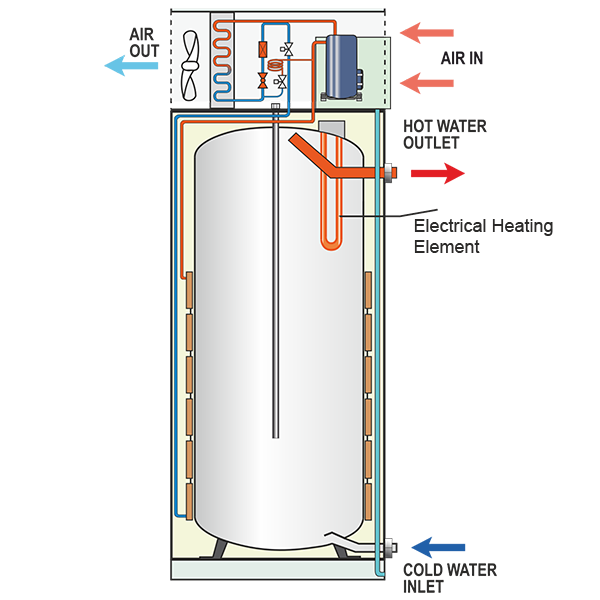
3. Environmentally Friendly Choice
HEAT PUMP WATER HEATERS AN ENVIRONMENTALLY FRIENDLY CHOICE
- Hiqh efficiency with coefficient of performance (COP) up to 4
- No fossil fuels are used or burned at the source
- Ozone layer-friendly refrigerants
- Uses less electricity than standard electric water heaters
- Contributes to space cooling at the same time
- Taps into heat sources typically discarded by other units for peak efficiency
1. What is Hardness?
Hard water is water that has high mineral content (in contrast with “soft water”). Hard water is formed when water percolates through deposits of limestone and chalk which are largely made up of calcium and magnesium carbonates. The total water hardness is the sum of the concentrations of Ca2+ and Mg2+ and is usually measured in ppm or parts per million.
2. What is TDS?
Total dissolved solids (TDS) is a measure of the combined content of all inorganic and organic substances contained in a liquid in molecular, ionized or micro-granular suspended form. TDS, like hardness is also measured in parts per million. Hardness is usually a subset of TDS.
3. I don't know the quality of my water. I just know that I am seeing white marks on my fittings. How do I find out the hardness?
Please drop us your contact details in the link: Book a Home Visit or call us 1800 266 2782. Our representatives will visit your home and do a free hardness test.
4. I do not see any problem with the water I am using. Why should I treat water for utility purposes?
You may think that you do not see the problems of impure utility water, but answer these questions to understand if that is true:
- Do you see white marks on your taps and fixtures in your bathroom that are difficult to remove? – This is because hardness in water is caused by presence of calcium and magnesium which form salts that stick to surfaces they come in contact with. These are very difficult to remove and leave ugly looking marks on your expensive fixtures, basins, etc.
- Do you notice the force of water in your taps and showers going down? – This is because the salts stick to surfaces and clog them reducing the pressure in your taps and fixtures.
- Have you faced a difference in the lather while shampooing from when you visit a different place? – Hard water lathers much less thus reducing the efficiency of your shampoos, soaps, detergents. Soft water on the other hand gives you a great bathing experience.
- Do you see your hair getting dry and fizzy as soon as it dries? – Hard water leaves salts on your scalp making it dry and frizzy.
5. What is the difference Between Ion Exchange technology and the Sequestering Technology?
Ion Exchange Technology and Sequestering Technology are both technologies used to treat the hardness in water. While Ion Exchange technology uses Resin to capture and thus remove Calcium and Magnesium ions from water(replacing it with Sodium); Sequestering Technology uses Polyphosphate Media to encapsulate the Calcium and Magnesium ions making them chemically inert, but do not remove them from water. Thus while the hardness test (which only detects the concentration of calcium and magnesium), will show a reduction in hardness after the ion exchange process, it will show no difference in the hardness level after sequestering. However, the effects of hard water such as permanent white scaling on taps, faucets and fixtures, damaged hair and skin due to hardness is prevented in both cases.
6. The Scale Prevention system does not show any difference in the TDS in water quality test. How do you claim that the product works to prevent scaling?
The Scale Prevention System uses the sequestering technology that does not remove the Calcium and Magnesium ions from water but encapsulates them with food grade polyphosphate sequester which makes the Calcium and Magnesium ions chemically inert thus ensuring that that the effects of hardness such as scaling are eliminated. The Hardness/TDS test, only shows the presence of these ions which is not changed, however, the encapsulation ensures that the effects of hardness are removed, thus preventing scaling. Here’s a video to show the difference between untreated water and water treated by 3M Scale Prevention System
7. Does a water softener give potable/drinking water?
Water Softeners only treat the calcium and magnesium content in the water reducing it to a tolerable limit. It does not treat the bacteria and other microbiological contamination in water that must be treated for the water to be potable – allowed for drinking.
8. Calcium and Magnesium are minerals required by the body. Why should we remove them from the same?
Yes, Calcium and Magnesium are minerals required for the body. However, the body requires the same in limited quantity. Water containing 300ppm or less of Hardness is considered soft water.
9. Are the softeners for industrial use?
These softeners are designed and manufactured specifically for residential purpose and are NOT softener plants meant for industrial applications.
10. Where do the softeners get installed?
In Villas, the softener can get installed right after the overhead tank or for a specific bathroom as per the requirement. In apartments, the softener can get installed for a single bathroom or if there is a single point of entry that is accessible for the specific flat. Please refer to the below image to get an idea of the installation point for Villas and Apartments.
11. Are the softeners for industrial use?
These softeners are designed and manufactured specifically for residential purpose and are NOT softener plants meant for industrial applications.
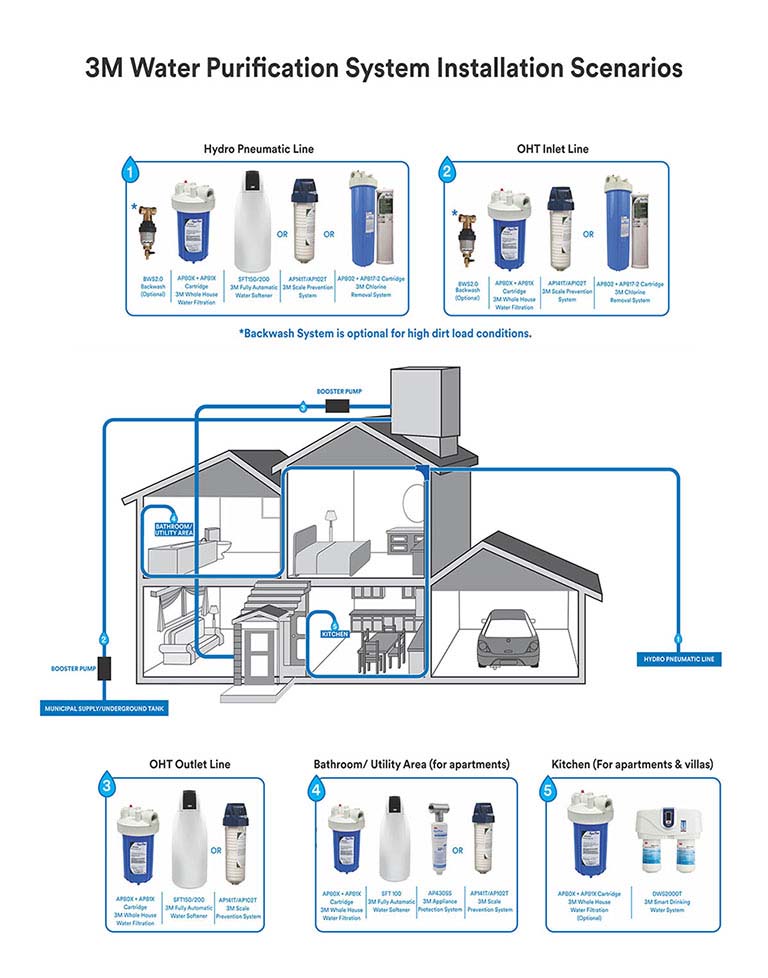
12. Do you provide drinking Water systems?
Yes. 3M Home Water Solutions has a range of products for treating impure water to potable water/drinking water systems The 3M Drinking Water System. It also has a range of products that do not provide drinking water but eliminate/treat other impurities in water such as hardness, chlorine, sediments, etc. which cause a lot of hazards even when used for utility purposes.
13. I live in a flat. Can I install the Water Softener in a flat? Where will it be installed in the flat?
Yes we have Water Softeners, specifically designed to fit into the flat. We can have the SFT100 installed inside your bathroom in your flat.
14. What is the recurring expenditure for the products?
The recurring expenditure varies for each product, water quality and consumption. Please find your nearest dealer at Where to Buy or call us at 1800 266 2782 to put you in touch with a nearest dealer.
15. Do you have a service team?
Yes, we have a service team to handle the installation and any post sales service you might require. Please call 1800 266 2782 for an installation request.
16. Do you do free installation?
The installation cost is NOT built into the price and is not free. Please note that the cost of installation varies depending on the type and area of installation. For best rates and right installation, please have the installation done through a 3M Trained Technician. You can call us at 1800 266 2782 to connect you with the same. The cost of any spares or additional requirements for installation will have to be borne by the customer.
17. What hardness level can your products handle?
The Fully Automatic Water Softener can handle a hardness level upto 1200ppm/ TDS value of 3000ppm. The Scale Prevention Systems can handle a Hardness level of 300ppm or TDS of 1000ppm. Please note that trained technicians will be able to serve a larger Hardness value by installing multiple units in combination.
18. Is your system susceptible to weather conditions?
The Fully Automatic Water Softener needs to be covered to protect it from the sun. The Scale Prevention Systems come with a transparent housing for easy cartridge viewing. However, this needs to be protected by the sun. In order to do the same, a Cover is provided with the product. If you do not receive a filter inside the product or from your distributor, call the toll free number 1800 266 2782 for assistance.
19. How is Iron in water harmful?
Clogs your skin pores leading to acne and wrinkles.
Leaves behind dark stains on your costly appliances, washroom fixtures and even on your clothes Clogs pipes with iron residue buildup leading to clogged sinks and reduced water flow in your house. Adds bad taste to water, which makes it very unpleasant to drink
20. How is hard water harmful?
Clogs your shiny fixtures and pipes with ugly deposits
Roughens your hair, making it frizzy and causing hair-fall
Leaves your skin dry causing irritation
